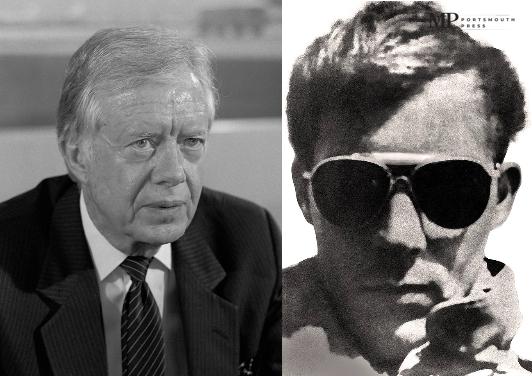In a remarkable moment of American political history, Hunter S. Thompson, the legendary journalist known for his “Gonzo” style, intersected paths with future President Jimmy Carter during a pivotal event at the University of Georgia in 1974. Their encounters and Thompson’s reflections are resurfacing in light of Carter’s recent passing at age 100, prompting many to reevaluate the lasting impact of their meeting amidst the backdrop of social change and political discourse.
Hunter S. Thompson’s Political Writing
Thompson’s work has always been steeped in the tumultuous waters of American politics. His book, Fear and Loathing on the Campaign Trail ’72, published 51 years ago, offered an unfiltered look into the bleak realities of political campaigning. In this groundbreaking work, Thompson captured the cynicism and disillusionment surrounding the American political system, which still echoes in today’s political landscape. This book served as a crystallizing moment for his career, drawing attention to the underlying truths many were hesitant to acknowledge.
Fear and Loathing on the Campaign Trail ’72
This seminal work, often regarded as a classic, not only documented the 1972 presidential election but also examined the cultural shifts occurring in America at the time. As Thompson delved into George McGovern’s campaign, he highlighted the complex interplay between politics and the media, revealing how these factors shape public perception and voter sentiment. His sharp critiques remain relevant as we navigate through modern elections.
Jimmy Carter and Hunter S. Thompson
Thompson’s encounter with Jimmy Carter came during a Law Day event at the University of Georgia, where Carter spoke passionately about civil rights and the importance of social justice. Thompson was deeply moved by Carter’s words, particularly his tribute to Martin Luther King Jr., and noted how Carter’s vision reflected a genuine concern for the marginalized in society. This speech struck a chord with Thompson, who shared a connection with Carter’s commitment to social reform, making this moment one of the defining experiences of their shared history.
The Impact of Carter’s Words
Carter’s emphasis on social justice during that speech not only impressed Thompson but also underscored a critical moment in political discourse in the 1970s. It was a time when America was struggling with its identity, and leaders like Carter sought to advocate for change. Thompson’s writings often pricked at the conscience of a nation, unearthing uncomfortable truths about society and politics at large.
The Enduring Legacy of Their Meeting
As we remember the recent passing of President Carter, it is essential to reflect on the conversations and encounters he shared with influential figures like Hunter S. Thompson. Their interactions remind us of the power of words and ideas in shaping the political landscape. Carter’s legacy as a fighter for peace and human rights intertwines with Thompson’s bold, often controversial journalism, creating a tapestry of American history that continues to inspire new generations to engage with politics more thoughtfully.
| Event | Date | Location | Impact |
|---|---|---|---|
| Law Day Speech | 1974 | University of Georgia | Carter’s speech catalyzed discussions on social justice |
| Publication of *Fear and Loathing on the Campaign Trail ’72* | 1972 | N/A | Revealed the darker side of political campaigning |
| Jimmy Carter’s Presidency | 1976-1981 | Washington D.C. | Focus on humanitarian efforts and peace |
In reflecting upon the lives of Hunter S. Thompson and Jimmy Carter, we uncover a poignant reminder of how individual voices—whether through political speeches or provocative journalism—can influence the fabric of our society. Their legacies continue to resonate, urging us to stay engaged and vigilant in the face of challenges.









